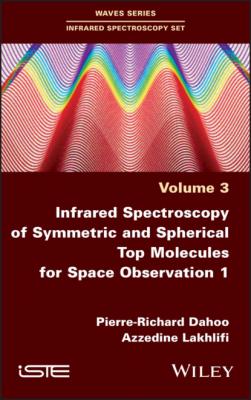ТОП просматриваемых книг сайта:
Infrared Spectroscopy of Symmetric and Spherical Spindles for Space Observation 1. Pierre-Richard Dahoo
Читать онлайн.Название Infrared Spectroscopy of Symmetric and Spherical Spindles for Space Observation 1
Год выпуска 0
isbn 9781119824053
Автор произведения Pierre-Richard Dahoo
Жанр Химия
Издательство John Wiley & Sons Limited
Table of Contents
1 Cover
4 Foreword
5 Preface
6 1 Group Theory in Infrared Spectroscopy 1.1. Introduction 1.2. The point-symmetry group of a molecule 1.3. Representations by square matrices (general linear group of order n on R or C: GLn(R) or GLn(C)) 1.4. Table of characters and fundamental theorems 1.5. Overall rotation group symmetry of a molecule 1.6. Full symmetry group of the Hamiltonian of a molecule 1.7. Correlation between the rotation group and a point-group symmetry of a molecule 1.8. Example of group theory applications 1.9. Conclusion 1.10. Appendices: Groups and Lie algebra of SU(2) and SO(3)
7 2 Symmetry of Symmetric and Spherical Top Molecules 2.1. Introduction 2.2. Symmetry group of molecular Hamiltonian 2.3. Symmetry of the NH3 molecule and its isotopologues ND3, NHD2 and NDH2 2.4. Symmetry of CH4 and its isotopologues CD4, CHD3, CDH3 and CH2D2 2.5. Symmetry group of the complete CNPI group 2.6. Conclusion
8 3 Line Profiles, Symmetries and Selection Rules According to Group Theory 3.1. Introduction 3.2. Symmetries of the eigenstates of the zeroth-order Hamiltonian 3.3. Intensity of the vibration–rotation lines and bar spectrum 3.4. Transition operator for the selection rules 3.5. Dipole moment operator and line profile 3.6. Irreducible representations of the vibrations of the molecules 3.7. Types of vibrations of irreducible representations 3.8. Rotation and spin Hamiltonian symmetries 3.9. Conclusion 3.10. Appendix: Absorption and emission of a molecule in the gas phase
9 4 Energy Levels of Symmetric Tops in the Gas Phase 4.1. Introduction 4.2. Vibrational–rotational motions of an isolated symmetric top 4.3. Vibrational motions of an isolated pyramidal symmetric top 4.4. Rotational motion of an isolated rigid symmetric top molecule 4.5. Rovibrational energy levels of an isolated symmetric top and selection rules 4.6. Application to the ammonia NH3 molecule 4.7. Appendices
10 5 Spherical Top CH4 5.1. Introduction 5.2. Characteristics of the CH4 molecule in gas phase 5.3. Tensor formalism for the CH4 molecule 5.4. Application to the CH4 molecule 5.5. Rotational structure in the degenerate vibrational levels 5.6. Conclusion 5.7. Appendices
11 References
12 Index
List of Illustrations
1 Chapter 1Figure 1.1. Symmetry operations and symmetry elements of a moleculeFigure 1.2. Equivalent symmetry operations of plane rotation and reflection over...Figure 1.3. Symmetry elements of the NH3 molecule and its reversed equilibrium c...Figure 1.4. Symmetry operations and flow diagram of point groups according to th...Figure 1.5. The operations equivalent to rotational symmetry (cyclic group of or...Figure 1.6. The effect of operation E* on a CH3D molecule. For a color version o...
2 Chapter 2Figure 2.1. Mobile reference frame and the two equilibrium configurations of the...Figure 2.2. Potential with two minima depending on the distance h

